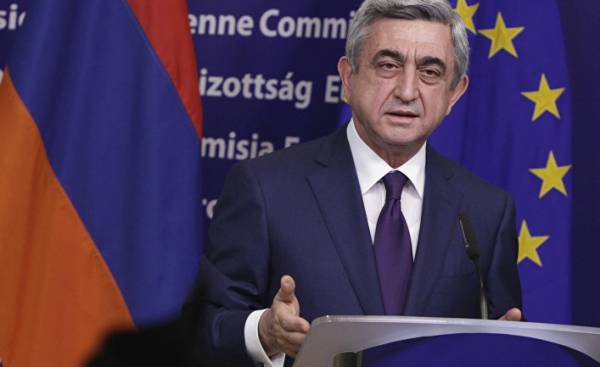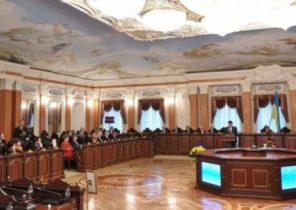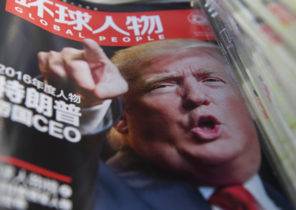
When, in 2013, Armenia started talks on establishing closer ties with the European Union, Moscow at the last moment intervened in the process and convinced Yerevan instead to join the Customs Union. Then it seemed that the issue of Armenia’s integration with the EU has been closed and that Russia cemented its position as a dominant player in Armenia.
But now Brussels and Yerevan have returned to this issue and prepared a new agreement which, apparently, will be signed without any problems. Primarily this is because of the agreement with the European Union has excluded the provisions that could jeopardize Russia’s position in this Transcaucasian state.
The new agreement, called “Agreement on a comprehensive and enhanced partnership”, approved in advance by both Brussels and Yerevan. He is expected to be signed in November at the summit of “Eastern partnership” of the EU. The document is not yet published, but Armenian and European diplomats say that it is very similar to the agreement reached in 2013, net of provisions on free trade, which now contradicted the obligations of Armenia in the Eurasian economic Union.
Russian officials have not yet spoken publicly about this, but behind the scenes, “Lavrov gave the green light,” said EurasiaNet.org a European diplomat in Yerevan, referring to the Minister of foreign Affairs of Russia Sergey Lavrov.
“In consultation with all stakeholders, including with Russia, we explained that the conversation is not about the Agreement on deep and comprehensive free trade area”, — said in an interview with EurasiaNet.org Deputy Minister of foreign Affairs of Armenia and chief negotiator on the issue, Ambassador Karen Nazaryan. — Regulations on free trade “was the main obstacle to signing the Association Agreement due to our decision to join the then Customs Union”.
Despite the relative limitations of the agreement, he, nevertheless, gives Armenia a serious alternative to close ties with Russia.
“We have long been conducting a multi-vector foreign policy, and our goal is to maintain a very balanced dialogue between our important partners, Russia, the European Union and the United States,” added Nazarian.
But in Armenia, some still fear that Moscow could upset these negotiations. “You never know because tomorrow Russia may pull out a gun from his pocket and put it on the table, as it was in 2013,” said Alexander Iskandaryan, Director of the analytical center “Caucasus Institute”. In 2013, when Armenia and the EU were negotiating the signing of the Association Agreement, Russia openly declared that it would sell weapons to Azerbaijan worth billions of dollars, as well as rumor that could dramatically raise the price of exports to Armenia, natural gas, noted Iskandaryan. “They even say anything did not have, and so everything was clear,” he said.
Concern that the deal may fall, has intensified in light of the recent critical statements of the EU Ambassador in Yerevan, said that the Election Commission “not credible”.
Representatives of the ruling Republican party of Armenia has reacted rather sharply. The Minister of justice David Harutyunyan June 15, called the criticism “an attempt to interfere in our internal political Affairs”. Meanwhile, some Armenian opposition leaders expressed the assumption that the statements Harutyunyan was the result of pressure SS the Russian side aimed at undermining the agreement with the EU.
But the majority of observers consider that this time the agreement is signed.
One of the reasons is that the geopolitical situation has changed dramatically since 2013. Ukraine then discussed their own Association Agreement with the EU, similar to the work of the Yerevan and Brussels. Russia was determined to prevent it, and Armenia has simply become a convenient instrument with which to intimidate Yanukovych. “It was not in Armenia and in Ukraine. It was a signal to Ukraine. Kiev seemed to be saying, “Look what we can do”,” said the European diplomat. (Yanukovych was subsequently ousted and the new government has completed negotiations with EU on Association Agreement, which should enter into force in September).
The second reason is that, from the point of view of Russia, the new Treaty of Armenia with the EU is relatively harmless. In the framework of the agreement Armenia calling for political reforms, many of which are potentially difficult to implement, and instead offer only limited economic incentives. In addition, in the contract there is nothing about cooperation with the EU in the security sphere. “Now they [the Russians] see that the geopolitical component is missing,” said Tevan Poghosyan, an Armenian Pro-Western politician and President located in Yerevan International center for human development.
“Russian is in fact no case to Armenia, told the aforementioned European diplomat. — They care about their military base. They want to keep their soldiers on the border with Turkey, on the border with Iran — and they really want to send its peacekeepers to Nagorno-Karabakh. That’s what they care about.”
According to the diplomat, Armenia also scrupulously followed so that the transaction does not run counter to its commitments in the framework of the Eurasian economic Union. Yerevan was careful that the diplomat even jokingly paraphrased the position of Armenia in the negotiations with the EU in this way: “We are ready to work with you, if Russia does not tell us that we do not fit”.







